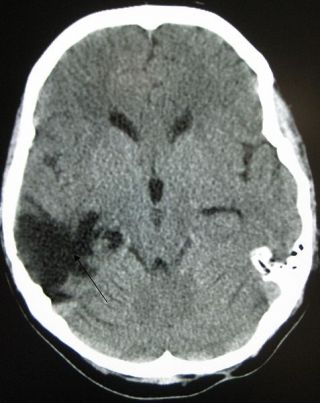ADHD
Why Do Brain Injuries Look Like ADHD?
Are ADHD and brain injuries linked, or do they just look similar?
Posted October 6, 2015

Problems after Brain Injury
A traumatic brain injury (TBI) results in damage to the brain that leads to problems like forgetfulness, poor focus, impulsivity, and mood shifts. It can happen from sports injuries, car accidents, falls, or other similar events that damage the brain. Concussion is a mild form of TBI. More severe TBI’s usually lead to longer lasting problems and in the most severe cases, they can cause long-term comas or even death.
The lasting effects of TBI can look amazingly similar to ADHD, leading some to wonder about a possible relationship between ADHD and TBI.
For instance, John was a 24-year-old student that I tested for cognitive impairments after his injury. He sustained a moderate to severe TBI from a motorcycle accident. Wearing a helmet probably saved his life, but it didn’t protect his brain from injury in the accident. Before his motorcycle crash, he had no major cognitive or interpersonal problems. Afterward though, he was constantly distracted, impulsive, unable to plan or organize, terrible at multitasking, and his friendships and romantic relationships became unstable or ended badly.
Sounds like adult ADHD, right? But because of the drastic changes after his accident we know that John’s problems came from his TBI. He had no early history to suggest ADHD.
Often the source of these problems is unclear, so we don’t know if they came come from a TBI, ADHD, or something else. That can lead to problems when you consider that ADHD diagnoses are widely perceived as being inflated, while cognitive problems following TBI might be under-reported.
Brain Injury or ADHD?
The problems related to ADHD and TBI look so similar that they are hard to tell apart. Some have suggested a link between the two disorders.
In a recently released Canadian article, researchers telephone surveyed almost 4,000 adults in 2011-2012. They found that almost 7 percent of those with a history of TBI met criteria for ADHD and about 6 percent had been diagnosed with ADHD at some time in their lives. Not surprising given the similarity in symptoms, or that perhaps those with ADHD are more prone to engage in high risk behaviors that make the chances of a TBI more likely (Ilie et al, 2015).
But diagnostic purists (like myself) argue that ADHD is a really developmental disorder, and that it can’t come from events like a TBI or a stroke. For us, ADHD is a developmental process unfolding probably as a result of biological and environmental factors, and that it must surface first in childhood. This pretty much follows the standard criteria for ADHD as set forth by the DSM-5, the psychiatric bible of diagnosis (APA, 2015).
And as for John’s problems? Well the DSM-5 has separate diagnoses for cognitive and other problems due to TBI, like Mild or Major Neurocognitive Disorder due to TBI, in a different area of the manual from ADHD (APA, 2013).
But the DSM-5 criteria are guidelines and not laws. Individual clinical judgment can always override the diagnostic criteria, or at least allow for other related diagnoses to be used. For instance, someone can assign a diagnosis of Other Specified ADHD for a presentation that looks a lot like ADHD but that doesn’t quite fit the usual criteria for ADHD. It’s up to the clinician to decide.
Other experts have mentioned an acquired form of ADHD that comes from a specific event (like TBI) rather than through development.
The New York Times for instance ran a question-and-answer column about adult ADHD. When asked about the possibility of adult-onset ADHD, one widely-known ADHD expert replied, “There is no evidence that ADHD can come on in mid- to late life unless it is a result of a brain injury or disease, in which case it is an acquired type of ADHD” [emphasis added].
Hence that would be described as an atypical form of ADHD, like Other Specified ADHD, rather than the Major Neurocognitive Disorder due to TBI option I argued for above.
So, Who Cares?
By this point you might be thinking, who really cares what it’s called? As long as I get treated for it what difference does it make? Isn’t this just a game of gotcha, or fussy academic nit-picking?
Actually it’s about ADHD’s basic, long-standing image problem.
Persistent diagnostic inconsistencies and slackness about ADHD directly relate to why the media and public widely see ADHD as over-diagnosed. And it is over-diagnosed.
When nearly everyone who walks into an ADHD specialty clinic gets an ADHD diagnosis, regardless of how different their symptoms are or how few of the actual ADHD criteria they meet, there’s a problem. Additionally, clinicians’ lack of knowledge about other causes of similar symptoms (like TBI), limited time to do a detailed patient history, and pressure to diagnose ADHD rather than to do a full investigation into the cause(s) of the presenting problems all contribute to this issue.
The issue of over-diagnosis actually seems to be growing rather than receding, and as it does the reputation of ADHD gets more degraded in the eyes of the public.
If you are going to a provider for possible ADHD-related problems, demand a thorough evaluation, preferably involving a clinical interview and cognitive/psychological testing, to truly confirm what is happening for you. They shouldn’t rely on self-report inventories alone.
Before getting placed on stimulants, for perhaps years at a time, you deserve nothing less than a painstakingly detailed and meticulous work-up to really know what is happening and to rule out all alternative possible causes.
American Psychiatric Association (2013). Diagnostic and statistical manual of mental disorders (5th ed.). Washington, DC: Author.
Can you outgrow ADHD? Or get it as an adult? (2011, February 10). The New York Times. Retrieved September 22, 2015 from http://consults.blogs.nytimes.com/2011/02/10/can-you-outgrow-a-d-h-d-or….
Ilie, G., Vingilis, E. R., Mann, R. E., Hamilton, H., Toplak, M., Adlaf, E. M., … Cusimano, M. D. (2015). The association between traumatic brain injury and ADHD in a Canadian adult sample. Journal of Psychiatric Research, 69, 174-179.




